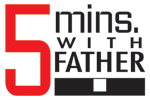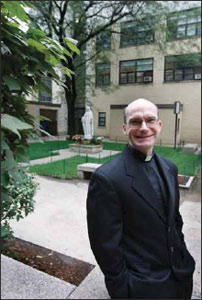September 14, 2008

From Purdue to priesthood

Father Joseph Noonan, vocation director for the archdiocese, stands in Holy Name Cathedral’s courtyard. He said he found his life’s call when he least expected. Catholic New World/Karen Callaway
He is: Father Joseph Noonan, archdiocesan vocation director since 2002.
Attended public schools in Frankfort, Ill., Lincoln-Way High School in New Lenox and Purdue University, where he earned a bachelor’s degree in accounting. Later earned a master’s in divinity at St. Mary of the Lake University. Ordained 1995. First Mass, St. Anthony Church, Frankfort.
Family life: Has four sisters and two brothers. “My parents started their own business right around the time I was born, Child Care, Inc.” They now own a small chain of child-care centers called Bobbie Noonan’s Child Care and two private religious grammar schools called Noonan Academies, with operations in the southwest suburbs of Chicago and Ft. Myers, Fla.
Why Purdue? “My two older sisters had gone there. As a youth I was able to go to a lot of Purdue football games and was on the campus quite a bit for a kid in grammar and high school. I started to fall in love with the campus itself. You learn the teams and history.”
Sports ’n’ more sports: “I played just about every sport the park district offered: baseball, Pop Warner football, basketball. In grade school I ran the mile in track — in high school I played on the ice hockey team and made the varsity team my freshman year, which was pretty cool.”
Sports heroes: “I went to Blackhawks’ games as a kid. There was a creek by our house that would freeze every winter. We’d be out there pretending to be Bobby Hull. If you were goalie you were Stan Esposito.”
Life in Frankfort: “We moved there in the ’70s. It was sparsely populated and a great place for families. Our grade school was across the street from a dairy farm. We didn’t lock our doors. We’d leave our keys on the dashboard of the family car, so if someone else in the family needed to use it the keys wouldn’t be in our pocket.”
Worked a lot: “We’d come home from grade school and my brothers and I and my dad would hop in the car with two or three lawn mowers and cut grass at the child-care locations. It was fun taking care of your own business.” He held outside jobs through high school and college, while helping with the family business. “It was good experience. It’s helped me in the priesthood. Even with wonderful people helping out, at the end of the day a parish priest has to make sure the lights are turned off, things are done and has to have that entrepreneurial attitude.”
The ‘good’ life: “I fell away from Mass attendance in college. I wasn’t angry or opposed to church teaching, but I was ignorant of my faith. I hadn’t absorbed a lot in CCD.” He lived back home for about six months after college.
The turn around: Due to his parents, he visited Medjugorje, Yugoslavia. “And that’s where I had a pretty profound conversion. I was 22 years old. It was 1986. I know the church hasn’t approved Medjugorje. I don’t really get involved in debate over that. But for me that was the place God chose to open my heart.”
Didn’t look for signs: “The Franciscans at the shrine told us, ‘This is the same Jesus that is in your parish back home. Don’t be looking for signs in the sky.’ It was a spiritual shock. I had to reevaluate my life, my goals. My prayer life had been superficial. I had wanted to be a successful real-estate person but when I came home all those plans didn’t have a lot of meaning anymore.”
Coming back: “I went back to church.” He got a job at a large firm as an accounting manager and moved to Lincoln Park. “First apartment was close to St. Alphonsus, then I moved near St. Clement’s and later I lived about a block away from St. Michael’s. I read the Bible and other Catholic books, helped out at soup kitchens and Habitat for Humanity. I began to feel joy in the love of God in a wonderful way. That led me to become more and more aware of my vocation to the priesthood.”
Now vocation director: “I challenge young people to acknowledge or not that God exists. If you acknowledge God does exist, do you think God desires to have a relationship with you? And if God does, don’t you think it would be a good idea to respond to that? I try to get high school students to begin taking adult ownership of their faith.”
College audiences: “I talk to college-age men about the fair level of success people aspire to. I tell them you might find some joy or happiness in owning several buildings as I did before going into seminary, but at the same time, true joy and peace had nothing to do with what I owned and possessed.”
Vocations count: Before his time, there was an intentional effort to get numbers. “Now they want us to do the best we can recruiting, but the candidates have to be called and suitable. It’s quality over numbers.”
How do priests stay connected socially? “They connect with others in different ways, cluster and deanery meetings, friends and family, and there’s crossovers on borders with other dioceses.” He’s gone on snow-ski vacations and golf vacations with his buddies. “I’m hitting the ibuprofen bottle more now and reading.”
Reading what? “I read workrelated books on faith. I kind of like mysteries; Tom Clancy action books; I enjoy David Baldacci, Robert Ludlum. I’ve read all the Bourne books. I love movies, too.”
His daring side: “I follow Chicago sports. I’m a Cubs fan, but I do like the Sox too. I went to the Sox/Cubs game in June and cheered for the Sox and the Cubs, which was probably politically incorrect. It’s sort of a sports ecumenism.” He also skateboards.
Favorite motto: “‘God is not boring.’ I tell young people, ‘If you pursue God, you will discover incredible things.’”
 Catholic
New World - Newspaper for the Archdiocese of Chicago
Catholic
New World - Newspaper for the Archdiocese of Chicago Archdiocese of Chicago Directory
Archdiocese of Chicago Directory Oficjalne wydawnictwo Archidiecezji Chicago w języku polskim
Oficjalne wydawnictwo Archidiecezji Chicago w języku polskim